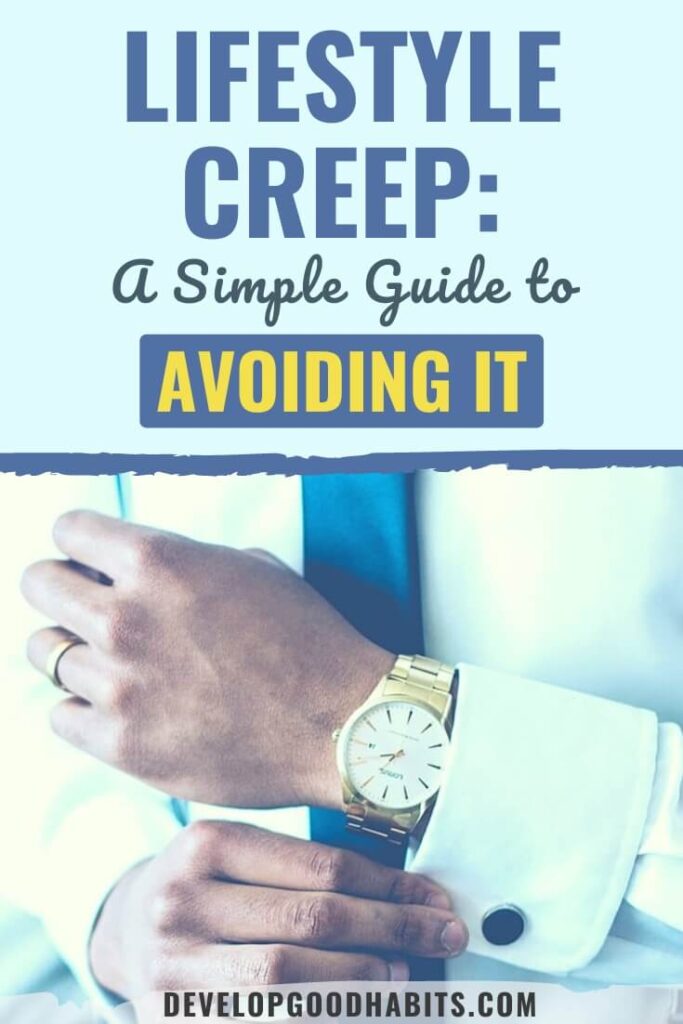There might be affiliate links on this page, which means we get a small commission of anything you buy. As an Amazon Associate we earn from qualifying purchases. Please do your own research before making any online purchase.
As people earn more money, they are tempted to upgrade their lifestyle.
That’s to be expected. After all, they have more income at their disposal. Buying a new home, a more expensive car, and vacationing at luxurious destinations are no longer dreams.
All of this is possible, thanks to a bigger paycheck, higher business income, a well-deserved bonus, massive inheritance, or a big retroactive child support payout. Cha-ching!
But here’s a reality check. If those people unconsciously increase their lifestyle without factoring in the drawbacks, they could end up becoming victims of lifestyle creep.
You could avoid the financial phenomenon by applying the habits and strategies that could protect you from spending more as you earn more.
In the end, you’ll continue enjoying life without increasing your debt or elevating stress, and be able to achieve your long-term financial goals.
What Is Lifestyle Creep?
Lifestyle creep, otherwise known as lifestyle inflation, is a phrase that describes a common financial phenomenon where people start spending more on goods and services as their income goes up.
Financial increases can come from a pay hike, a boom in business, inheritance or a big lottery win.
Regardless of the income source, the beneficiaries could end up unintentionally creating a higher standard of living that they’re unable to sustain. If this happens, it typically leads to financial debt and additional stress that can be avoided if they did the math upfront.
Two Examples of Lifestyle Creep
Example #1
Your neighbor, John, gets promoted. With the promotion comes a raise in pay. Cha-ching! John is excited. Naturally so.
He had his eyes on a couple of things he wanted and felt the pay increases give him the leverage to get them. He can’t decide if he should go for a bigger house or a new car. Finally, he decides on both.
Although he’s earning more, he fails to factor in all the incidental expenses and hidden fees that come with buying a new home and a new car.
For example, closing fees for a home purchase, higher property tax, and monthly home maintenance. In this case, it’s a higher car note, increased insurance premium, and more expensive maintenance.

After documenting his income and expenses after the first month of making those major lifestyle upgrades, John realizes he’s ‘in the red’.
His bills are piling up, he’s maxed out his credit cards, and can only afford to pay the minimum balance. Paying the minimum incurs a late fee, which only adds to his growing debt.
John had good intentions, but he ended up living beyond his means. He finds himself stressed and worried about how to make ends meet.
Example #2:
Your bestie, Susan, came into some extra money from an inheritance left by her grandfather. She’s surprised he chose her as a beneficiary for such a large amount of cash.
Susan grew up in a household where her parents were living paycheck to paycheck and could only afford to provide for her basic needs.
With this money, Susan says she can finally have the freedom to spend without worrying. Over the course of a few months, she accumulated a ton of expensive household articles and clothing.
She soon realizes she ran out of space and is living in clutter. To solve the problem, she rents a storage unit that costs her $600 per month to keep her items. That is a total of $7,200 a year!
That’s money she could have accrued in savings had she not splurged on unnecessary items.
Not so long after, the inheritance money ran out and Susan found herself unable to afford the storage unit on her normal income. Lifestyle creep sneaked up on her very quickly.
Now she’s in debt to the storage company. She has to pay up for the past 3 months or they’ll auction off her belongings. That results in an unforeseen but avoidable financial setback.
In both example cases, John and Susan misjudged their financial status and ended up living outside their means.
Signs You're Victim of Lifestyle Creep
Has some invisible monster been eating away at your income and savings?
Could the monster be the financial investments/decisions you’ve made since you came into more funds?
You might very well be experiencing lifestyle creep.
Somehow there’s an unconscious belief that the more you have the more you should spend. Here are some signs the financial phenomenon sneaked up on you:
Spotting the signs of a higher standard of living and less saving portfolio is easy to spot if you’re living mindfully. Don’t feel guilty or ashamed for having a lack of financial mindfulness. Lifestyle creep can affect anyone.
In fact, I’ve been a victim and had to quickly take stalk of my relationship with money and my core beliefs about money to bring things back into balance.
9 Effective Strategies to Avoid the Dangers of Lifestyle Creep
Those who have faced the consequences of lifestyle inflation know all too well that it presents major financial obstacles.
They found that after upping their cost of living, they had to work harder to make more money to support the upgraded standard of living.
It’s like chasing their tail to catch their tail. At the end of the month or financial period, they’re still in debt.
Fortunately, this type of financial predicament that can cause you to live paycheck to paycheck is completely avoidable.
Here are some tips that can help promote financial sense and discipline.
Before we proceed, if you prefer to watch instead of read, here's teh video version of this post;
#1. Reassess Your Needs VS Your Wants
To prevent your spending from eating your savings, it is imperative to reassess your needs and your wants. Do it right away, before you splurge on designer items or lifestyle activities that were only recently outside your financial reach.
I mentioned ‘reassess’ because when a person’s household income goes up, what used to be a want is automatically treated as a need. One of the things that helped me was doing an inventory of the things I pay for but don’t use or hardly use.
Right away you’ll notice you’re paying for things that are not considered needs if you conduct a similar inventory. You also haven’t taken any steps to end the services. For example:
#2. Create A Practical Monthly Budget
You want to cut back on spending to increase saving, but that doesn’t mean you have to live as a pauper. However, you may have to act as if you didn’t have an income increase–at least for the time being.
That’s where a budget that is practical comes in. Be true to yourself and write down the things you absolutely need to pay for each month.
Make the budget as basic as possible and within your current standard of living. Food, housing, transportation/gas, utilities, clothing, phone, and child care are some priorities you can’t compromise on. However, these necessities should still occur within reason.
Under expenses, allocate a larger percentage of extra income toward savings or investing and paying off debts.
#3. Setting Long-Term Financial Goals
Outlining long-term money goals is an effective way to curb impulsive spending and keep you focused on the important things you wish to achieve. Your financial goals may include paying off outstanding debt, such as a student loan.
Other important goals are setting up an emergency savings fund or accumulating the down payment for a bigger home. Increasing the monthly amount for your retirement savings is another beneficial idea.
Having those goals on a vision board where you can see them every day helps remind you to spend within the margin of your basic budget.
Take a further step by scheduling a reminder notification for reviewing and tracking your goals, e.g., once a week.
#4. Spend Mindfully
Sticking to your budget is a great way to keep spending under control. There’s something else that is effective at helping you live within your budget and below your means. It’s called a shopping list and the benefits are undoubtedly obvious.
Another way to spend mindfully is to manage your emotions. Impulsive spending may occur at a higher rate in people who use shopping sprees as a way to cope with stress, anxiety, or depression.
Financial planner, Paco de Leon, advised us to create a “buy list.” Review the list after a week or month to determine if you still want/need those items. A buy list “re-creates the experience of shopping” while protecting against careless spending.
#5. Track Your Spending
There’s an interesting phenomenon where the more money someone has, the more lax or complacent they become with it. Taking things for granted can lead to an expensive change in your lifestyle.
You may not even be aware of what’s happening until your credit card gets declined while making a purchase. Save yourself the embarrassment with a spreadsheet or spending tracker app.
Things don’t have to get that far if you take the time to track how much you’re spending and on what. A good rule of thumb is to spend within the basic budget you created in the first place.
Regularly reviewing your financial goals will also help you spot discrepancies in spending. For example, impulsively shopping for things you don’t need.
Another useful daily habit is reviewing your credit/debit card purchases on a daily basis. You could even set up banking alerts to notify you whenever your spending exceeds the limit you’ve placed on yourself.
#6. Automate Your Savings And Investments
Setting up an automated transfer of a fixed sum to your savings, investment account, or retirement fund on a weekly, bi-weekly, or monthly basis is a great way to beat lifestyle creep. Schedule the funds to leave your account immediately after your salary is deposited.
I like the fact that the money is transferred out of your reach as if it never existed. At least you could think of it that way to avoid spending your savings.
The automatic fund transfer will ensure you stay on track with your financial goals, as far as increasing savings is concerned. More importantly, you’ll only be left with just the right amount of money needed in your checking account to spend on necessities.
#7. Don’t Try to ‘Keep Up with the Joneses‘
Getting social media feeds and photos of your friends wearing designer outfits, sporting luxurious cars, or vacationing in extravagance can make us feel left out.
Don’t give in to this type of social media peer pressure. You don’t know their financial status or what they can afford.
Before you try to compete or keep up with their lifestyle, ask yourself if you can afford it without putting yourself in unnecessary debt. Be real with yourself and answer honestly. Next, question whether the desire fits within the financial goals you’ve set for yourself. By now reality should start kicking in.
Hopefully, the desire to keep up with your friends remains a desire until you really can afford to splurge that way–guilt-free.
#8. Spend As If Your Income Was the Same
Spending within or below your means, when your income goes up, helps prevent you from inflating your cost of living.
As a result, you will avert getting stuck in a lifestyle you cannot afford. Such an unexpected financial crisis can lead to an increase in daily stress, worry, anxiety, and restless nights.

Continue living a simple or minimalistic life by shopping for bargains or limiting dining out.
Shannon McLay, a financial advisor and founder of The Financial Gym said “By continuing to spend within the means of your previous income, you’ll maintain the ability to save and invest more money each month.”
#9. Reward Yourself Occasionally
Attempting to avoid the dangers of lifestyle creep doesn’t include taking away the joy of living. You work hard for your money and rewarding yourself is just as important as saving for a better financial future.
Think of a pleasurable activity to do once or twice a month that is all about you. It could be buying yourself an inexpensive gift or treating yourself to a professional stress-relieving massage.
Consider it self-care and a way to curb emotional or impulsive spending when life gets tough. Be sure to allocate a fixed amount for this activity in your monthly budget.
Taking stock of your little victories is the key to long-term goal achievement. Watch the video below to learn the 3-step process you can use to start celebrating small wins.
How Long Does It Take to Create New Habits to Prevent Lifestyle Creep?
I agree, all of this sounds easier said than done. Anthony J. LaBrake, CFP at Adam Financial Associates told Synchrony Bank,” It’s easier to start a new habit than to break one.” And he’s right. Creating new healthy habits can take anywhere from 21 days to several months, depending on the nature of it.
The timeline for creating new habits is usually shorter because it’s easier to create new neural pathways for positive changes than to erase old brain patterns.
You’re capable of building new financial habits to curb lifestyle inflation and achieve your financial goals with more ease. Here are some helpful practices suggested by Financial Gym.
Final Thoughts on Avoiding Lifestyle Creep
You don’t have to be a frugalist, minimalist, or valuist to stop lifestyle inflation in its tracks. Those saving strategies have their benefits.
The idea is to cultivate habits that promote financial discipline to keep your spending under control.
Proper money management will help you achieve your long-term financial goals and increase your savings over time. That doesn't mean you should no longer spend money on activities that bring you pleasure.
The most important takeaway is understanding that just because you’ve acquired more funds does not mean you have to spend more lavishly.
And if you're looking for more resources to help you manage your money better, be sure to read these articles:
- How to Stop Spending Money: 11 Money-Saving Tips
- 17 Best Books on Saving Money & Personal Budgeting
- 21 Best Money Saving Apps, Websites, and Tools
Finally, if you need help with building habits, then check out this nine-step blueprint that walks you through the entire process of creating lifelong habits.)



